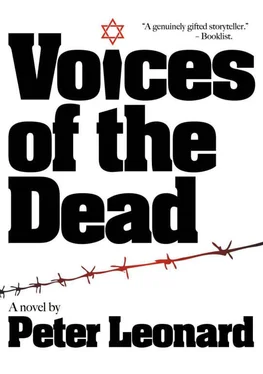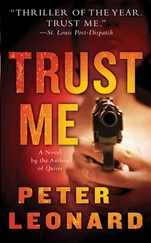“Harry, that was some slick shit. You like a spy or something?”
“Looking out for you,” Harry said.
“Since when?” Cordell flashed a smile. “No offense, Harry, but I’ve got to get away from you.”
“I don’t blame you,” Harry said.
“Always tell it like it is, don’t you?” Cordell grinned. “Don’t get me wrong, you cool, but you bad luck.”
“I can’t disagree with you,” Harry said.
He drove to Odeonsplatz, parked and waited. It was 5:50 p.m. “I told Colette to meet us here.”
At 6:15 Cordell said, “I don’t think she got the message.”
“She may not be back yet,” Harry said. “I’m going to try her again.” He could see a familiar yellow phone booth across the plaza. He opened the door and got out of the car.
Harry dialed Colette’s number, got her answering machine again and hung up. He called the hotel, asked if he had any messages. Nothing. Went back to the car and got in.
“What’s up?”
“Colette still isn’t there.”
“Try her later.”
He drove to 64 Kaulbachstrasse, a tree-lined street in a university neighborhood, slowed down, pulled over and parked.
“What’s this?”
“I have to stop here and see someone. It’ll just take a few minutes.” Harry glanced across the front seat at him. “Want to come with me?”
“Think I’ll wait here.”
Irena and Leon were in 2A, the upper floor of an old house. He stood at the door, pressed the buzzer. It didn’t make a sound and he wondered if it was working. He tried the door. It was closed but not all the way. He pushed it open. The foyer was dark. He turned on a light and walked up the stairs. It reminded him of his parents’ house, stucco walls, wood beam ceiling, simple architecture. He knocked on the door. “Irena, it’s Harry Levin.” He waited. Tried the handle, the door opened. He walked in, stood in the living room, faint smell of sautéed onions. “Anyone home?” The stereo was turned on but no music was playing.
He went in the kitchen, saw a frying pan on the stovetop, overcooked onions stuck to the bottom. He went back through the living room, down a hallway, wood floor, into a bedroom, green carpet, double bed, framed prints on stucco walls, TV on a pedestal table at the foot of the bed.
The bathroom door was closed halfway. He didn’t want to barge in if she was taking a bath. “Irena, it’s Harry Levin.” As he got closer he could see a stream of blood on the white tile floor. He took another step, saw feet and legs, the naked bodies of Leon and Irena. He drew the Colt, cocked the hammer and went in. The tub and surrounding walls and ceiling were spattered with blood. He studied the scene, bodies positioned the way Martz and Lisa were, two shell casings on the white tile, lingering odor of dead meat, like the smell of a butcher shop. He heard footsteps in the hall behind him.
“Don’t move,” a voice said in German.
Harry looked over his shoulder at two Munich police officers, guns drawn, aimed at him.
“Place your weapon on the floor.”
Harry bent down, laid the Colt on the white tile.
“Place your hands on your head.”
Harry did, and one of the cops approached him, kicked his gun skidding across the floor, and cuffed his hands behind his back. The two cops escorted him through the apartment, down the stairs and out the door. Almost dark, sun fading, red highlights over the rooftops. There were two patrol cars parked on the street and more uniformed police standing in the yard. A crowd from the neighborhood had gathered, people staring at Harry as he came out. He walked past the first patrol car and saw Cordell in the backseat. Their eyes met, Cordell shook his head.
“You have a gun,” Huber said.
“I better,” Harry said. “The way things have been going.”
“Do you know the penalty for carrying a concealed weapon in Germany?”
They were in an interrogation room, Huber sitting to his right, putting on his glasses, blank expression.
“We will come back to this. Why don’t you tell me what happened.”
“I was visiting friends,” Harry said, stretching the truth a little.
“The people you visit do not seem to live very long.” Eyes looking at him over the black frames of the glasses.
“They were dead when I found them.”
Huber said, “Who do you think is killing these people?”
Harry didn’t know if he could trust him, didn’t know how much to tell him. Huber could have been a Nazi sympathizer for all he knew. “If I tell you, you won’t believe it.”
“The situation you are in, I think you had better.”
“Ernst Hess,” Harry said, letting the name hang. Huber kept his eyes on him, brow furrowed, serious, and then a hint of a smile. More emotion than Harry had ever seen from him. “He’s trying to cover up what he did during the war.”
“What are you talking about?”
Harry told him.
“If this were true,” Huber said, “why was he not prosecuted?”
“There were no witnesses,” Harry said.
“But now you have come forward.” He paused. “You make these accusations. What proof do you have?”
“Go to the morgue,” Harry said. “The bodies are piling up. A few days ago you found an auto dealer and his wife, the Lachmanns, shot the same way as the others, but you haven’t connected the dots.”
“Maybe the dots lead to you.”
Colette got back to her apartment at 6:30 Saturday evening, listened to Harry’s message. She went to Odeonsplatz to meet him, arriving at 6:45. Walked around, didn’t see him. Tried his hotel from the pay phone. He didn’t answer. She went back to her apartment, checked her messages again, nothing from Harry. She called his hotel and left a message. Maybe he was out with his friend.
She tried him again first thing in the morning. He was still checked in but didn’t answer. Now Colette was worried. She phoned Bernd Kramer, her contact with the police, and found out Harry was in custody at Stadelheim. Arrested for carrying a concealed weapon, awaiting arraignment.
Monday afternoon, Colette was on the phone with her editor, Gunter, in Berlin, discussing the risks of running her story about Hess. “You’ll get the photos and the article on Wednesday. Incriminating stuff. This should put a wrench in Hess’ political future.”
“I’m more concerned about your future as a journalist. Hess is popular, well liked. There will be a backlash. You could be a target. I’m not even sure Max will agree to publish it.”
“Can you hang on?” Colette said. “Someone is ringing the bell.” She put the phone down, crossed the living room and looked out the window, saw him and went back to the phone. “Gunter, just a minute, the postman is delivering a package.” She buzzed him in and opened the door. Heard him coming up the stairs. “Thank you so much,” Colette said as he approached, face partially hidden under the brim of the cap. He was carrying a small rectangular package, his shoes making a snapping sound on the tile floor.
She was wondering who it was from, glanced at the label on the box. “ Der Spiegel .”
He looked at her and said, “The magazine?”
“I am a journalist.”
“You have to sign.” He patted his shirt pocket and the front of his uniform jacket. “Forgive me, I have misplaced my pen.”
She noticed his manicured nails and shoes, hand-made black leather like Max wore, her editor-in-chief in Berlin, the shoes contrasting the plainness of the uniform. “I’ll be right back.” She walked quickly through the apartment, glanced at the phone on the table, Gunter still on the line, went into her bedroom, closed the door and locked it. Knew she had only a minute or two before Hess came after her. The photos from the rally were in an envelope on her desk, Colette regretting now she hadn’t sent them earlier. She tucked the envelope in her purse, grabbed her passport.
Читать дальше












